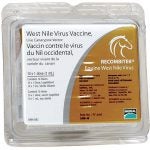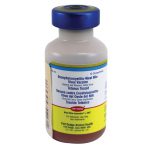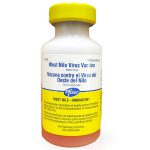The West Nile Virus is a virus that causes an inflammation of the brain (encephalitis) or inflammation of the lining of the brain and spinal cord (meningitis) in horses. The virus is transmitted by mosquitoes, and it is widespread throughout the entire United States.
West Nile Virus Symptoms
A horse infected with the West Nile Virus will exhibit the following symptoms: lethargy, weakness, lack of coordination, paralysis or even death.
How prevalent is the West Nile Virus in United States?
According to a report published by the United States Department of Agriculture, in 2016 there were 374 reported cases of the West Nile Virus in the United States.* In 2015, there were 225 reported cases. That’s an increase of 66% in one year!
How to protect your horse against the West Nile Virus:
Reduce the mosquito population by using foggers, and mosquito repellents, remove standing water, maintain stables clean. Also protect horses by keeping them indoors during peak mosquito activity times. Implementing a vaccination program is very effective in protecting your horse against the West Nile Virus.
Adult Horses, Previously Vaccinated: Spring is the best time of the year to vaccinate your horse just prior to the start of the mosquito season.
Adult Horses, Previously Unvaccinated: Based on the actual vaccine being used, a primary series of 2 doses is given to adolescent horses with a 4- to 6-week interval between doses is recommended. Annual revaccination is strongly recommended.
Pregnant Mares, Previously Vaccinated: Typically, four to six weeks prior to foaling.
Pregnant Mares, Previously Unvaccinated: A primary vaccination series should be implemented immediately.
Foals of vaccinated mares: Depending on the type of vaccine used, the administration of a primary 3-dose series starting at 4 to 6 months of age is recommended with a 4- to 6-week interval between the first and second dose. The third dose needs to be given at 10 to 12 months of age.
Foals of unvaccinated mares: At 3 to 4 months of age, a primary series of vaccinations should be given with a 4-week interval between the first and second dose, and an 8-week interval between the second and third dose. This recommended dosage is based on the type of vaccine being administered.
Naturally infected and recovered horses: Most recovered horses might develop a life-long immunity. Revaccination is recommended if the horse’s immune status has changed or if advised by a veterinarian.
The following vaccines can help protect your horse against the West Nile Virus:
Recombitek West Nile Vaccine is recommended for the vaccination of healthy horses in the prevention of viremia, caused by the West Nile Virus infection. Recombitek is proven to work fast and last throughout the mosquito season.
WEST NILE-INNOVATOR+EWT is for the vaccination of healthy horses as an aid in the prevention of viremia caused by the West Nile virus, and as an aid in the prevention of equine encephalomyelitis due to Eastern and Western viruses, and tetanus.
West Nile Virus Vaccine is indicated for the vaccination of healthy horses as an aid in the prevention of viremia caused by West Nile Virus. West Nile Vaccine for horses is FDA approved for use in veterinary medicine.
To sum it up, the West Nile Virus is transmitted to horses by mosquitoes. The virus can cause encephalitis and meningitis. Symptoms of the West Nile Virus in horse include: lethargy, weakness, lack of coordination, paralysis. In some cases the West Nile Virus can lead to death. Ensuring the area around horses is free of mosquitoes is one way to protect against the virus. In addition, vaccinating your horse against the West Nile Virus is very effective in preventing the virus.
*Source: United States Department of Agriculture. 2016 Equine West Nile Virus Case Reports. 2016. https://www.aphis.usda.gov/animal_health/downloads/animal_diseases/2016_wnv_report.pdf Accessed on 1/17/17.








